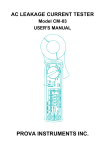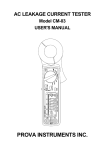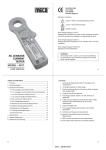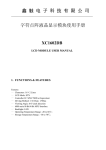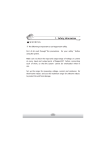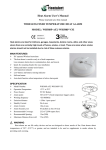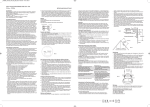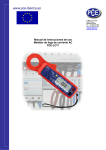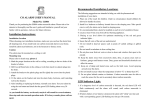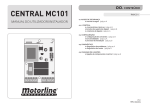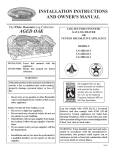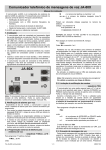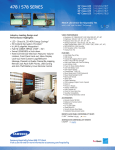Download AC LEAKAGE CURRENT TESTER
Transcript
AC LEAKAGE CURRENT TESTER Model 9809 USER’S MANUAL TABLE OF CONTENTS Ⅰ.Features…………………………………………………………………………1 Ⅱ.Panel Description………………………………………………………………2 Ⅲ.Operation lnstructions…………………………………………………………4 A.AC Leakage current Measurements………………………………………4 1.Leakage current Flowing into Ground Conductor……………………4 2.Out of Balance Leakage current…………………………………………5 3.Using the 50/60and Wide Selector………………………………………6 B.AC Load Current Measurement……………………………………………7 C.AC Voltage Measurements…………………………………………………7 D.Resistance and continuity Measurement…………………………………8 E. Relative Reading Measurements…………………………………………8 F. Holding the LCD Reading……………………………………………………8 G.Finding the MAX/MIN Value…………………………………………………8 H.Auto-Power-Off………………………………………………………………9 IV.Specifications……………………………………………………………………9 V. Battery Replacement…………………………………………………………10 Ⅰ.Features 1.Accurate AC digital clamp meter for leakage current measurement. 2.10μA high resolution on 40mA range. 3.Shield transformer jaws to minimizs the effect of external stray magnetic field. 4.Large jaw with 30 mm diameter. 5.Five Ranges (40mA, 400mA,4A,40A,100A)for all application. 6.A filter circuit is designed to eliminate the effect of high frequency noise and harmonics by setting the frequency selector switch at the 50/60 Hz position for AC current measurement. 7.Large 3 3/4 digits LCD 8.Fast bargraph display (20 times/sec.)for transient observation. 9.Continuity and frequency measurements. 10.Max/Min and Data Hold functions. 11.Relative Measurement. 12.600V overload protection for ohm measurement. 13.Easy single rotary switch for any function selection. 1 Ⅱ.Panel Description 1.Transformer Jaw This is used to pick up current signal.To measure DC/AC current, conductor must be enclosed by the jaw. 2.Transformer Trigger This is used to open the jaw. 3.Function Selector Switch This is used to select the function user desired, such as ACV ,ACA,ohm and continuity. 4.Frequency Selection Switch At 50/60Hz position,only the low frequency signal is measured.At wide position,signal from 40-1KHZ is measured. 5.Data Hold Button once this button is pushed,reading shall be held on the LCD. Press again to release it. 6.Max/Min Hold Button This button is used to enable the maximum or minimum value to be displayed and updated during measurement. Press once, minimum value shall be displayed and updated. press again, maximum value shall be displayed and updated. Press again (the third push ),clamp meter return to normal measurement mode. 7.Zero/Relative Button once this button is pressed, the current reading shall be set to zero and be used as a zero reference value for all other subsequent measurement. 2 8.LCD This is a 3 3/4 digit liquid crystal display with maximum indication off 3999. Function symbols, units, bargraph, sign, decimal points, low battery symbols, Max/Min symbols, and zero symbol are included. 9.Low Battery Symbol When this symbol appears, it means the battery voltage drops below the minimum required voltage. Refer to Section V for battery replacement. 10.Zero/Relative Symbol When this symbol appears, it means a reference value has been subtracted from the actual reading. The reading shown is a offseted value. Press and hold the zero button for 2 seconds to disable this function. 11.Data Hold Symbol Once the hold button is pressed, this symbol appears on LCD. 12.Bargraph Bargraph has forty segments. It displays segments proportional to the actual reading. Each segment represent one count. 13. Max/Min Hold symbol Once the Max/Min button is pressed, either MAX or MIN shall be displayed on LCD. 14.Continuity Symbol If ohm and continuity function is selected, this symbol shall appears on LCD. 15.Units symbols Once a function is selected, corresponding unit (V,Ω, A,or Hz) shall be displayed on LCD. 16.V Ω Hz input Terminal This terminal is used as input for voltage, ohm/continuity, or frequency measurements. 17.COM Terminal This terminal is used as common reference input. 18.Hand strap Put your hand through the hole of hand strap to avoid accidental drop of the clamp meter. 3 Ⅲ. Operation Instructions A. AC Leakage Current Measurements WARNING: Make sure that all the test leads are disconnected from the meter’s terminals for current measurement. 1. Leakage current Flowing into Ground conductor 4 a.Set the rotary switch at desired range. b.Press the trigger to open the jaw and fully encloes the wire goes to the ground. Make sure the two half jaws are properly closed. c.Read the measured value from the LCD display. 2. Out of Balance Leakage current 5 a. Set the rotary switch at desired range b.Press the trigger to open the jaw and fully enclose all two wires (single phase, two wires), three wires(three phases, three wires), or four wires(three phases, four wires).Make sure the two half jaws are properly closed. c.Read the measured value from the LCD display. 3. Using the 50/60 and wide Selector 50/60 position This clamp meter has very good frequency response due to the electric property of the transformer jaws used. Therefore, the measurement result contains not only the fundamental frequency of 50/60Hz but also the high frequencies and harmonics superimposed on the fundamental frequency. To eliminate the effect of high frequency noise, a low pass filter is designed to filter out high frequency signal. To enable the filter, set the switch at the 50/60 position. The filter’s cut-off frequency is set at 100Hz with an attenuation characteristic of approx. 24dB/octave. Wide position If the circuit under test is originated from a high frequency generating device such as inverter, switching regulators, etc., then the switch should be set at wide position to measure the signal which contains the frequency from 40Hz-1kHz. To make sure the presence of high frequency signal, set the switch at 50/60 and wide position to see the difference. If the reading is very different, it is certain that the high frequency signals or harmonics present. 6 B.AC Load Current Measurement LOAD CURRENT LEAKAGE CURRENT a. Set the rotary switch at desired range. b. Press the trigger to open the jaw and fully enclose only one wire. No air gap is allowed between the two half jaws. c. Read the measured value from the LCD display. C.AC Voltage Measurements WARNING: Maximum input for DC V is 600,and for AC V is 600. Do not attempt to take any voltage measurement that exceeds the limits. Exceeding the limits could cause electrical shock and damage to the clamp meter. 7 a.Set the rotary switch at 400V b.Insert the test leads into the input jack. c.Connect the test prods of the test leads in PARALLEL to the circuit to be measured. d.Read the measured value from the LCD display. WARNING: Before taking any in-circuit resistance measurement, remove power from the circuit being tested and discharge all the capacitors. D. Resistance and Continuity Measurement 1. Set the rotary switch at Ω 2. Insert the test leads into the input jack. 3. Connect the test prods of the test leads to the two ends of the resistor or circuit to be measured. 4. Read the measured value from the LCD display. 5. If the resistance is lower than 40Ω, a beeping sound shall be heard. E.Relative Reading Measurements The zero button also can be used to make a relative measurement. Once the button is pushed, the current reading is set to zero and a zero symbol shall be displayed on LCD. All the subsequent measurement shall be displayed as a relative value with respect to the value being zeroed. press the zero button for 2 seconds to return to normal mode. F.Holding the LCD Reading Press the HOLD button, then the reading shall be hold and kept on LCD. G.Finding the MAX/MIN Value Press the MAX/MIN button to enable the maximum and minimum values to be recorded and updated during measurement. Push the button once, the maximum value shall be displayed and updated. Push again (second push ), the minimum value shall be displayed. Push again(third push), MAX/MIN function shall be disabled and return to the normal measurement mode. 8 H. Auto-Power-Off The meter will turn itself off 30 minutes after power-on. To turn it on again, user can either press the HOLD button or turn the power off and turn it on again. To disable the Auto-power-off function, hold the HOLD button while turning on power. IV.Specifications(23℃±5℃) AC current: Accuracy Wide(400-1KHz) Range Resolution 50/60 Hz 40mA 400mA 10μA 100μA ±1.0%±0. 5mA ±3.0%±5.0mA ±4.5%±0. 5mA ±3.0%±5.0mA 4A 40A 1mA 10mA ±4.0%±0.1A ±4.0%±1.0A ±4.0%±0.1A ±4.0%±1.0A 80A 1 80-100A 100mA 100mA ±2.5%±1.0A ±5.0%±1.0A ±3.0%±1.5A ±5.0%±1.5A 1 Though the meter can display up to 400A,it is not calibrated beyond 100A AC Voltage( input impedance:10MΩ) Range Resolution 50/60Hz 40-1KHz 400V 0.1V ±1.5%±2dgts ±2.0%±4dgts Resistance (Ω) and continuity: (open voltage 0.4V) Range Resolution Accuracy Beeping 40-400Ω 0.1Ω Conductor size: Battery Type: Display: Range Selection: Overload indication: Power Consumption: Low battery indication: Sampling Time: ±1.0%±2dgts <38.0Ω Overload protection AC 600V OL Protection AC 600V 30mm max.(approx.) One 9V NEDA 1604 3 3/4 LCD with 40seg. bargraph manual left most digit blinks 10mA(approx.) 2 times/sec.(display) 20 times/sec.(bargraph) 9 Operating Temperature: Operating Humidity: Storage Temperature: Storage Humidity: Dimension Weight: Accessories: -10℃ to 50℃ less than 85% relative -20℃ to 60℃ less than 75% relative 210mm(L)×62.0mm(W)×35.6mm(H) 8.3″(L) ×2.4″(W) ×1.4″(H) 200g(battery included) Carrying bag×1 Users manual×1 9V NEDA 1604×1 V. Battery Replacement When the low battery symbol is displayed on the LCD, replace the old batteries with two new batteries. A.Turn the power off and remove the test leads from the clamp meter B.Remove the screw of the battery compartment. C.Slide off the battery compartment. D.Remove the old batteries. E.Insert one 9V NEDA 1604 or G6F22 batteries. F.Replace the battery compartment and secure the screw. 10












